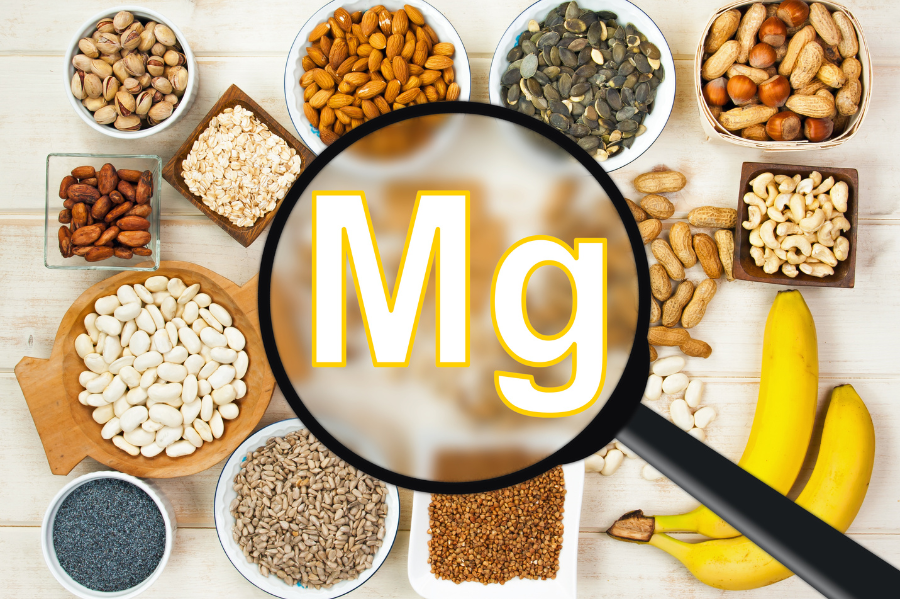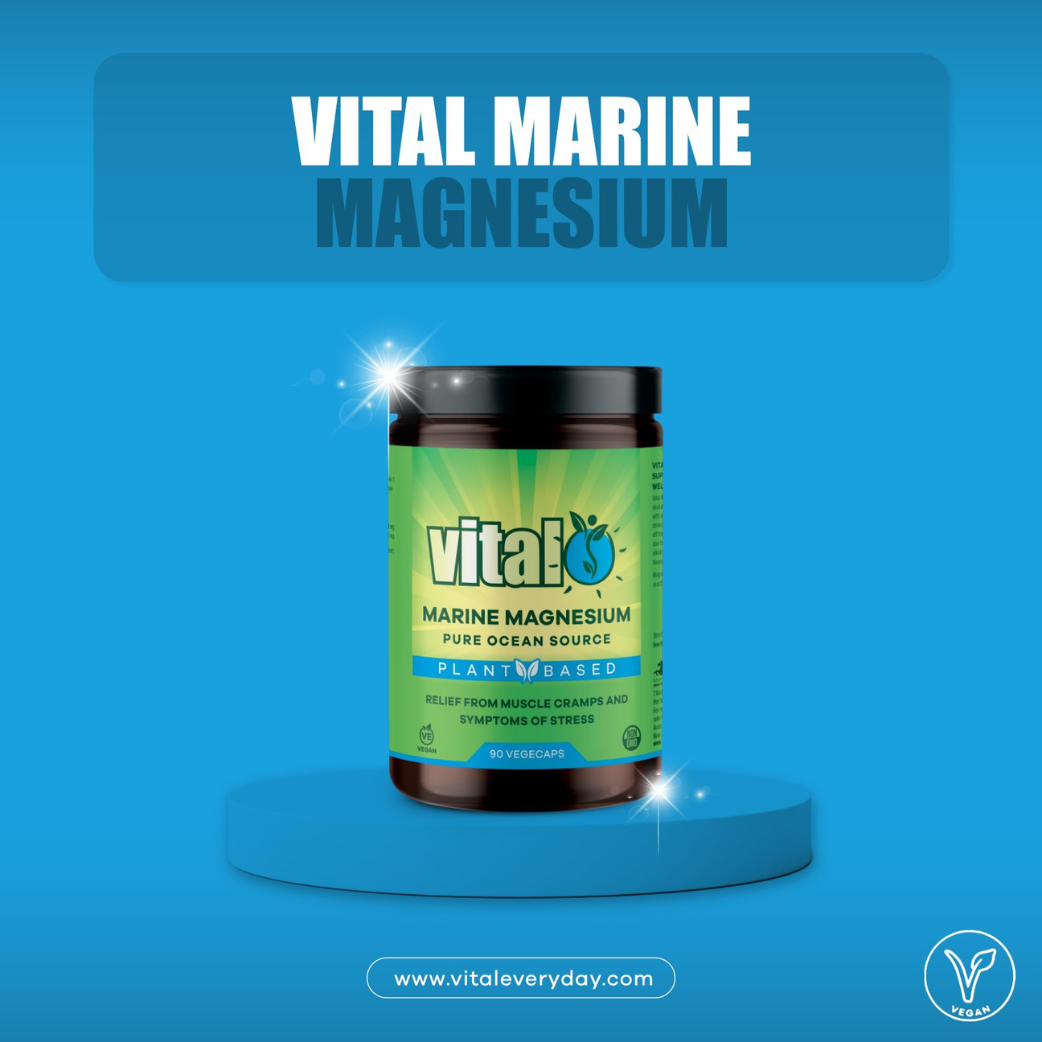
Magnesium is a crucial mineral for maintaining health, playing a vital role in over 300 biochemical processes in the body. However, despite its importance, magnesium deficiency is more common than you might think, particularly in Australia. Studies indicate that up to 35% of Australians may not be getting enough magnesium from their diets [1]. This deficiency can lead to a range of issues, from fatigue and muscle cramps to more serious health concerns such as cardiovascular disease.
With many Australians struggling to meet their magnesium needs, a superior, bioavailable form like Aquamin Magnesium, found in VITAL Marine Magnesium, offers an effective solution. Let’s explore the benefits of magnesium, why Aquamin Magnesium stands out, and how much you’d need to eat in food sources to match the benefits provided by VITAL Marine Magnesium.
At a Glance
- Magnesium is essential for muscle function, heart health, and mental well-being.
- Aquamin Magnesium, found in Vital Marine Magnesium, is a highly bioavailable form of magnesium derived from seawater.
- Aquamin’s unique marine source makes it more easily absorbed by the body, offering enhanced health benefits.
- Studies suggest that Aquamin Magnesium may provide better support for bone density and inflammation reduction compared to other magnesium supplements.
What is Magnesium?
Magnesium is a mineral that plays a critical role in many of the body’s functions.
Despite its importance, magnesium deficiency is quite common. Modern diets, often low in magnesium-rich foods like leafy greens, seeds, and nuts, combined with factors such as soil depletion, can make it difficult to meet the body’s needs through diet alone. This is where magnesium supplements can provide much-needed support.

Why is Magnesium Important for Health?
Magnesium’s wide-ranging benefits make it indispensable for overall health and wellbeing:
Muscle and Nerve Function
Magnesium helps regulate muscle contractions and supports proper nerve signal transmission, making it essential for athletes and those who suffer from muscle cramps.
Bone Health
Magnesium works with calcium and vitamin D to build and maintain strong bones. Research shows that people with higher magnesium intake tend to have better bone density and a lower risk of osteoporosis as they age.
Cardiovascular Health
Magnesium helps regulate blood pressure, supports normal heart rhythm, and may reduce the risk of cardiovascular diseases like hypertension and stroke.
Mental Health
Studies have shown that magnesium may help improve mood and reduce symptoms of anxiety and depression by balancing neurotransmitters in the brain.

What is Aquamin Magnesium?
Aquamin Magnesium is a highly bioavailable form of magnesium, derived from the mineral-rich seawater off the coast of Ireland and Iceland. Unlike many other magnesium supplements, which are often synthetic or extracted from rock sources, Aquamin Magnesium comes from a sustainable, natural marine source.
Aquamin’s unique composition includes not only magnesium but also trace elements that further enhance its bioavailability. This means that it is absorbed more efficiently by the body, leading to better utilisation and greater health benefits.
The Benefits of Aquamin Magnesium Compared to Other Forms
Aquamin Magnesium stands out for several reasons:
- Superior Bioavailability: The key to Aquamin’s effectiveness lies in its enhanced bioavailability. A study published in the European Journal of Nutrition [2] found that magnesium derived from marine sources is absorbed more readily than magnesium oxide, a common form found in many supplements. This means that you need less Aquamin to achieve the same health benefits.
- Bone and Joint Health: Aquamin Magnesium’s composition makes it particularly beneficial for bone health. It has been shown to support bone mineral density better than some other forms of magnesium. A study highlighted that Aquamin Magnesium may reduce the risk of bone disorders such as osteoporosis and osteopenia, making it ideal for those at risk of bone loss [3].
- Anti-Inflammatory Properties: Inflammation is a root cause of many chronic conditions, from arthritis to heart disease. Research suggests that magnesium can help reduce inflammation, and Aquamin Magnesium, with its additional trace minerals, may offer even greater anti-inflammatory benefits. A 2019 study found that Aquamin reduced markers of inflammation more effectively than magnesium citrate, a more commonly used form [4].
- Sustainability: Sourced from clean, mineral-rich seawater, Aquamin Magnesium is harvested sustainably, making it an eco-friendly option compared to some other magnesium supplements derived from mined sources. This is a key benefit for environmentally-conscious consumers.

How to get enough Magnesium daily
Most health professionals recommend that adults aim for around 300–400 mg of magnesium per day, depending on age, gender, and health status. Magnesium is found in many foods, but reaching the recommended daily intake through diet alone can be challenging. To match the magnesium in one dose of VITAL Marine Magnesium (300 mg), you would need to consume:
- 4 cups of cooked spinach
- 2 cups of almonds
- 4 avocados
- 200 grams of dark chocolate (over 2 large bars)
While these foods are nutritious, relying on them alone to meet your magnesium needs can be challenging. Supplementing with bioavailable Vital Marine Magnesium provides an easy and effective way to ensure you’re getting enough of this essential mineral.
Conclusion
Magnesium is a powerhouse mineral that supports numerous bodily functions, and supplementing with VITAL Marine Magnesium can offer a range of additional benefits. Its superior bioavailability, anti-inflammatory properties, and positive impact on bone health make it a smart choice for anyone looking to boost their magnesium intake. Whether you're looking to support your muscles, maintain heart health, or improve your overall wellbeing, VITAL Marine Magnesium is a natural and sustainable solution that stands above other forms of magnesium on the market.
Cautions*:
Cardiovascular disorders like hypertension and stroke are serious issues and any symptoms or concerns should be reported and discussed with a health care professional.
Mental health issues such as anxiety and depression are serious illnesses any symptoms should be reported to and discussed with a health care professional
